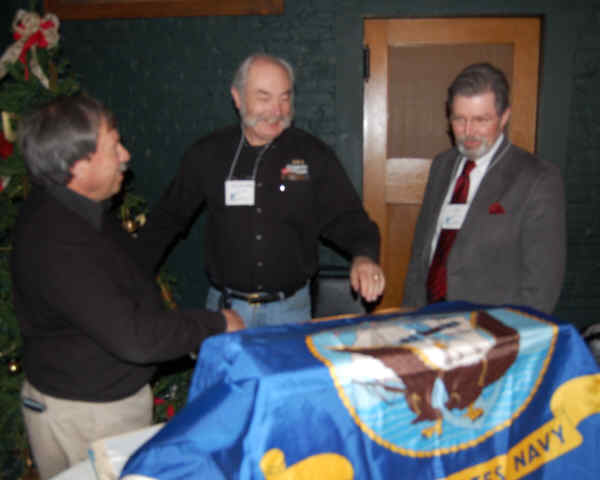 Paul Davis, left, and "Sailor Bob" Boquette, describe a Navy flag to Jack Frost, right.
Paul Davis, left, and "Sailor Bob" Boquette, describe a Navy flag to Jack Frost, right.
Did the U.S. Navy Win the Civil War? Local Scholars Make Case at Roundtable
Tim Younkman to Speak on Civil War Newspapers at Feb. 9 Meeting
January 30, 2011
By: Dave Rogers
Paul Davis, a Marine, and "Sailor" Bob Boquette, Navy vet, say the Navy won the Civil War.
The "Anaconca Plan," a strangling strategy posed by old soldier Winfield Scott, was a great success.
The pair presented the program "The Other Civil War, From a U.S. Navy Perspective," recently at the 7th Michigan Cavalry Civil War Roundtable.
Retired Bay City Times reporter Tim Younkman will be the presenter on "Newspapers in the Civil War" on Wednesday, Feb. 9 at 7 p.m. at the Stein Haus. Guests and prospective members are welcome. The March 16 program will feature Gary Batzlaff on "Lincoln's Security," and the annual dinner is slated April 13, with program yet to be announced.
Controlling the Mississippi River and clamping on a blockade on Southern ports was Scott's idea. And, though not well accepted, even by Secretary of the Navy Gideon Welles, it was implemented and it worked.
There was the "blue navy," operating in the ocean, and the "brown navy," roaming the muddy rivers.
The Anaconda plan was effective beyond all visions of its aged, overweight and infirm planner, Gen. Scott, who could not even mount a horse yet headed the Union military at the start of the war in 1861.
As the Union Army struggled early in the war, and Scott was forced out of his post in November 1861, the naval blockade he recommended bought time for the army to grow and mature.
The Navy had just 7,000 men, old officers and a fleet of about 30 warships of War of 1812 vintage, most located offshore.
Only about 20 percent of U.S. sailors "went South," the local presenters said. The Navy was integrated from the get-go, unlike the Army that had to wait for a Presidential proclamation in 1863 to allow enlistment of black soldiers, said Davis and Boquette.
Although many in the U.S. military had predicted a quick end to the fighting and suspected Old Fuss and Feathers was growing senile, his blockade was no doubt a key, according to Davis and Boquette.
New Orleans fell in 1862 and squadrons and flotillas choked off commerce and shipping in the "Father of Waters," the Mississippi.
The local presenters profiled quirky characters who figured big in the Navy like Gustavas Vasa Fox, a Swede, Benjamin Isherwood, chief engineer with a background in railroading banished to Mare Island by David Dixon Porter and several other Porters, inventor of the Monitor John Ericsson, another Swede, armaments man John Adolphus Dahlgren, "Dirty Bill" Porter, Commando William Cushing and Robley "Fighting Bob" Evans.
As the war progressed, the Navy gained control of all major rivers and successfully blockaded 3,500 miles of coast, although that strategy was only marginally effective until 1864.
The presentation also covered a variety of ships, from "cheesebox on a raft" ironclads to oldtime sailing vessels. the Army also had 3,500 ships, mainly transports. "Without transports, the Army couldn't survive," opined Sailor Bob.
Although most bombardments failed because the Navy couldn't get enough elevation on guns, and the potential of combined naval and ground actions went unrealized, the Civil War helped the nation build the greatest Navy in the world.
This was vital, as seapower allowed the U.S. to fight elsewhere rather than on our soil, the pair concluded.
###

